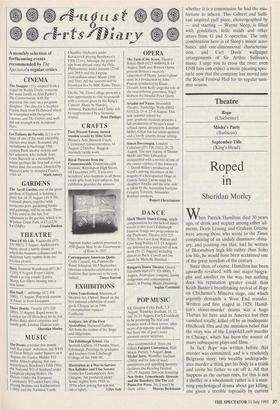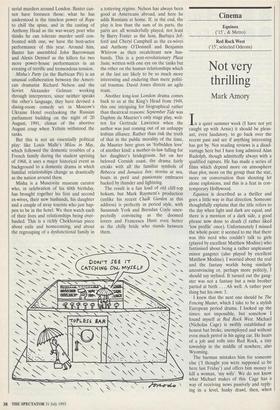Theatre
September Tide (King's Head) Rope (Chichester) Misha's Party (Barbican)
Roped in
Sheridan Morley
hen Patrick Hamilton died 30 years ago, of drink and neglect among other ail- ments, Doris Lessing and Graham Greene were among those who wrote to the Times complaining of an unduly dismissive obitu- ary, and pointing out that, had he written of Bloomsbury high life rather than Soho low life, he would have been acclaimed one of the great novelists of the century.
Since then, of course, Hamilton has been upwardly revalued, with one major biogra- phy and another on the way, but nothing does his reputation greater credit than Keith Baxter's breathtaking revival of Rope on Chichester's Minerva stage, one which urgently demands a West End transfer. Written and first staged in 1929, Hamil- ton's closet-murder drama was a huge Thirties hit here and in America but then vanished totally, killed off by an inadequate Hitchcock film and the mistaken belief that the story was of the Leopold/Loeb murder in Chicago, which has been the source of many subsequent plays and films.
In fact, Rope was written before that murder was committed, and is a resolutely Belgravia story: two wealthy undergradu- ates murder a third, put his body in a trunk and invite his father to eat off it. All that happens as the curtain rises, for this is not a thriller or a whodunnit; rather is it a stun- ning psychological drama about gay killing, one given a terrible topicality by current serial murders around London. Baxter can- not have foreseen those; what he has understood is the timeless power of Rope to chill the spine, and in the casting of Anthony Head as the war-weary poet who thinks he can tolerate murder until con- fronted with one, we have the best-actor performance of this year. Around him, Baxter has assembled John Barrowman and Alexis Denisof as the killers for two more power-house performances in an evening of terrific and tremendous tension.
Misha's Party (in the Barbican Pit) is an unusual collaboration between the Ameri- can dramatist Richard Nelson and the Soviet Alexander Gelman: working through interpreters, since neither speaks the other's language, they have devised a dining-room comedy set in Moscow's Ukraine Hotel overlooking the Russian parliament building on the night of 20 August, 1991, climax of the abortive August coup when Yeltsin withstood the tanks.
But this is not an essentially political play: like Louis Malle's Milou in May, which followed the domestic troubles of a French family during the student uprising of 1968, it uses a major historical event as background to a domestic drama in which familial relationships change as drastically as the nation around them.
Misha is a Muscovite museum curator who, in celebration of his 60th birthday, has brought together his first and second ex-wives, their new husbands, his daughter and a couple of stray tourists who just hap- pen to be in the hotel. We then watch each of their lives and relationships being over- hauled. This is a richly Chekhovian piece about exile and homecoming, and about the regrouping of a dysfunctional family in a tottering regime. Nelson has always been good at Americans abroad, and here he adds Russians at home. If, in the end, the play is less than the sum of its parts, the parts are all wonderfully played, not least by Barry Foster as the host, Barbara Jef- ford and Cheryl Campbell as the ex-wives and Anthony O'Donnell and Benjamin Whitrow as their recalcitrant new hus- bands. This is a post-revolutionary Plaza Suite, written with one eye on the tanks but the other on the human relationships which at the last are likely to be so much more interesting and enduring than mere politi- cal traumas. David Jones directs an agile team.
Another long-lost London drama comes back to us at the King's Head from 1949, this one intriguing for biographical rather than theatrical reasons: September Tide was Daphne du Maurier's only stage play, writ- ten for Gertrude Lawrence when the author was just coming out of an unhappy lesbian alliance. Rather than risk the truth of that in the public morality of the time, du Maurier here gives us 'forbidden love' of another kind: a mother-in-law falling for her daughter's bridegroom. Set on her beloved Cornish coast, the drama fairly creaks with all the familiar symbols of Rebecca and Jamaica Inn: storms at sea, boats in peril and passionate embraces backed by thunder and lightning.
The result is a fair load of old cliff-top hokum, but Mark Rayment's production (unlike his recent Chalk Garden at this address) is perfectly in period style, with Susannah York and Brendan Coyle unex- pectedly convincing as the doomed lovers and Francesca Hunt even better as the chilly bride who stands between them.



















































 Previous page
Previous page